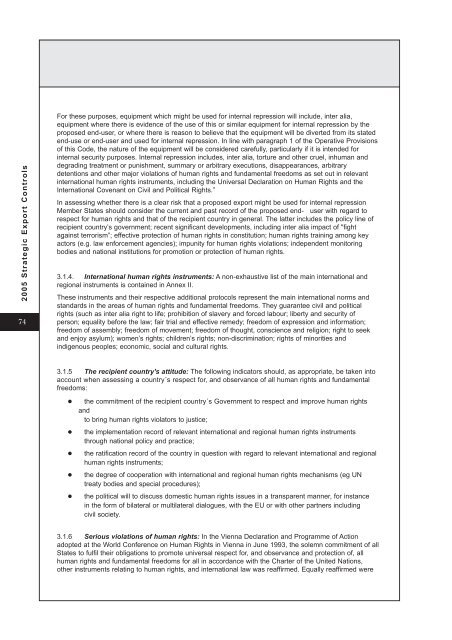Annex A - Official Documents
Annex A - Official Documents
Annex A - Official Documents
You also want an ePaper? Increase the reach of your titles
YUMPU automatically turns print PDFs into web optimized ePapers that Google loves.
2005 Strategic Export Controls<br />
74<br />
For these purposes, equipment which might be used for internal repression will include, inter alia,<br />
equipment where there is evidence of the use of this or similar equipment for internal repression by the<br />
proposed end-user, or where there is reason to believe that the equipment will be diverted from its stated<br />
end-use or end-user and used for internal repression. In line with paragraph 1 of the Operative Provisions<br />
of this Code, the nature of the equipment will be considered carefully, particularly if it is intended for<br />
internal security purposes. Internal repression includes, inter alia, torture and other cruel, inhuman and<br />
degrading treatment or punishment, summary or arbitrary executions, disappearances, arbitrary<br />
detentions and other major violations of human rights and fundamental freedoms as set out in relevant<br />
international human rights instruments, including the Universal Declaration on Human Rights and the<br />
International Covenant on Civil and Political Rights.”<br />
In assessing whether there is a clear risk that a proposed export might be used for internal repression<br />
Member States should consider the current and past record of the proposed end- user with regard to<br />
respect for human rights and that of the recipient country in general. The latter includes the policy line of<br />
recipient country’s government; recent significant developments, including inter alia impact of "fight<br />
against terrorism”; effective protection of human rights in constitution; human rights training among key<br />
actors (e.g. law enforcement agencies); impunity for human rights violations; independent monitoring<br />
bodies and national institutions for promotion or protection of human rights.<br />
3.1.4. International human rights instruments: A non-exhaustive list of the main international and<br />
regional instruments is contained in <strong>Annex</strong> II.<br />
These instruments and their respective additional protocols represent the main international norms and<br />
standards in the areas of human rights and fundamental freedoms. They guarantee civil and political<br />
rights (such as inter alia right to life; prohibition of slavery and forced labour; liberty and security of<br />
person; equality before the law; fair trial and effective remedy; freedom of expression and information;<br />
freedom of assembly; freedom of movement; freedom of thought, conscience and religion; right to seek<br />
and enjoy asylum); women’s rights; children’s rights; non-discrimination; rights of minorities and<br />
indigenous peoples; economic, social and cultural rights.<br />
3.1.5 The recipient country's attitude: The following indicators should, as appropriate, be taken into<br />
account when assessing a country´s respect for, and observance of all human rights and fundamental<br />
freedoms:<br />
� the commitment of the recipient country´s Government to respect and improve human rights<br />
and<br />
to bring human rights violators to justice;<br />
� the implementation record of relevant international and regional human rights instruments<br />
through national policy and practice;<br />
� the ratification record of the country in question with regard to relevant international and regional<br />
human rights instruments;<br />
� the degree of cooperation with international and regional human rights mechanisms (eg UN<br />
treaty bodies and special procedures);<br />
� the political will to discuss domestic human rights issues in a transparent manner, for instance<br />
in the form of bilateral or multilateral dialogues, with the EU or with other partners including<br />
civil society.<br />
3.1.6 Serious violations of human rights: In the Vienna Declaration and Programme of Action<br />
adopted at the World Conference on Human Rights in Vienna in June 1993, the solemn commitment of all<br />
States to fulfil their obligations to promote universal respect for, and observance and protection of, all<br />
human rights and fundamental freedoms for all in accordance with the Charter of the United Nations,<br />
other instruments relating to human rights, and international law was reaffirmed. Equally reaffirmed were

















